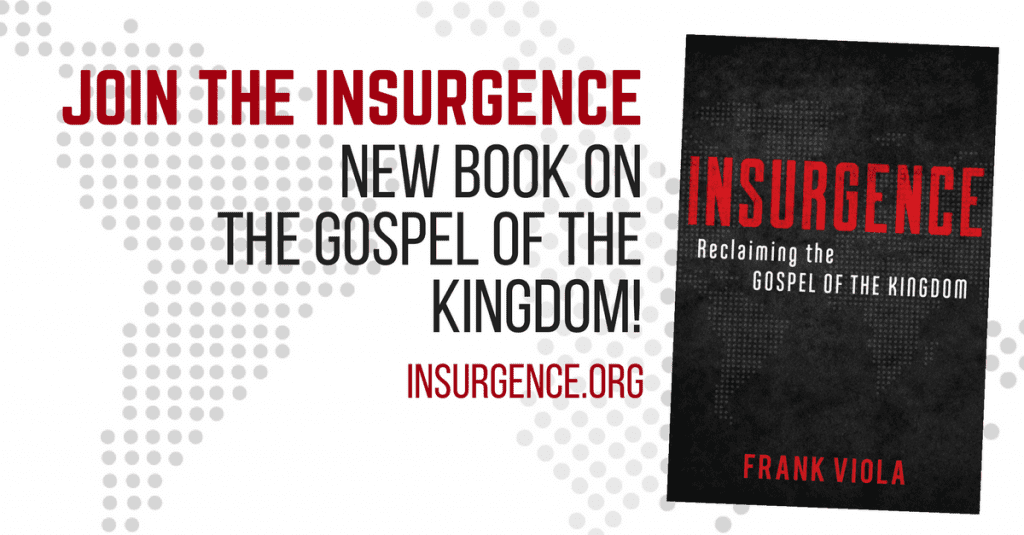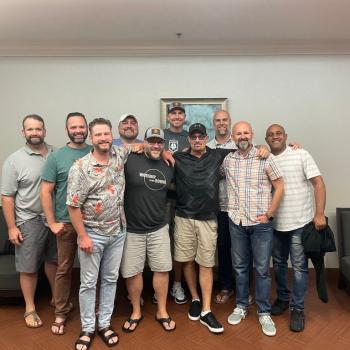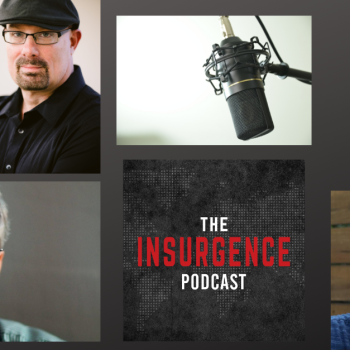Joe Kohler has released a new book. It’s called Gate Crashers: The Offensive Church.
I caught up with Joe to discuss his new book. Enjoy!
Instead of asking, “what is your book about,” I’m going to ask the question that’s behind that question. And that unspoken question is, “how are readers going to benefit from reading your book?”
Joe Kohler: My hope is that readers will be edified and encouraged to examine some of our modern church practices that currently reside in a theological blind-spot, particularly the function of evangelists in the body of Christ. We are not the first generation to inherit practices and traditions that we accept without thinking about it. Whether readers agree or disagree with my conclusions, at the very least they can expect to be challenged to think about God’s purpose in and through His church.
As you have pointed out, especially in your excellent book The Untold Story of the New Testament Church, our present generation of Christians is often ignorant of the overall sweep of God’s activity in His world as a result of a deficient system of Bible study that uses proof-texts to prove theological points and win arguments with Christians of a different flavor. God’s purpose was never to build a particular denomination, but a people for Himself that know Him and who make Him known. We shouldn’t be surprised to find that God designed His church in accordance with His plan, and when we stray from His design we do so to our own detriment.
What does the title, Gate Crashers, mean exactly?
Joe Kohler: Gate Crashers follows from what Jesus said about His church in Matthew 16:18. As the kingdom of heaven expands, the gates of hades are unable to withstand this advance. By design, the church is called to crash the gates of the kingdom of darkness and bring them down as God works in and through us to expand his kingdom to the ends of the earth, until the knowledge of His glory fills the earth as the waters cover the sea.
What makes a church offensive? (That word can be understood in a negative way.)
Joe Kohler: The subtitle of The Offensive Church was intentionally chosen because of its potential ambiguity. The main argument I make is that Jesus’ church is designed to be offensive as opposed to defensive in its posture. More specifically, “gates” are defensive structures and the church is called to crash the gates of hades, not set up our own. Much of the modern professing church structures are defensive in their posture and forms, which directly causes a lot of the disunity and “mini-kingdom” building of denominationalism we presently experience.
There is a second sense that being offensive in this way (as opposed to defensive) will sometimes be perceived as offensive (in the negative sense of something that offends the sensibilities of this world). Christians have been told by our Lord that the gospel message itself is foolish, scandalous, and offensive to those who are perishing.
The prevailing culture of tolerance has contributed to the defensive posture of the professing church today, which views being offensive (which we must be willing to be if we are to be faithful to God’s calling) as the biggest sin. Of course, Christians should never seek to be rude, belligerent, or anything short of loving and gracious in our dealings with the world.
Even still, Jesus offended those He came to save and He promised that the world would hate His followers because it hated Him first. If we really love people (like Jesus does), then we must be willing to be hated and even possibly offend those whom are currently perishing under the wrath of God and citizens of the kingdom of darkness by changing our posture and mindset from defensive to offensive.
Tell us a bit about the experiences that shaped the insights in the book.
Joe Kohler: I can say with all integrity that this was not something I ever intended to write about or attempt to raise awareness of! The factors that led to these insights were myriad and often painful. For the sake of brevity, the two major experiences were spending significant time with some brothers and sisters in Christ in Ethiopia, and the working of God in and through our local church family.
It was eye-opening to cross cultural barriers and fellowship with Christians in a different culture. These Ethiopian Christians are incredibly effective at planting churches, making disciples, and are experiencing genuine fellowship and changed communities. All without many of the material resources that we have access to! One of the most important factors for their potency was tied to their recognizing the leadership that Jesus gave to His church as described in Ephesians 4:11–16, specifically the role of the evangelist in the local church. We were able to bless and encourage them, and I think they blessed and encouraged me far beyond what I did for them.
Independently, while I was seeing the fruit of this in a foreign land, God was working in the heart of my ministry partner to awaken him to his call as an evangelist in the local church setting. As we discussed, prayed, studied, and reached out to others for their input regarding this shift, we discovered that this was a theological blind-spot. Most discussion on Ephesians 4:11 relates to whether or not apostles and prophets are still for today and whether or not pastors and teachers are the same thing or not (the 5-fold vs. 4-fold argument). The evangelists are largely ignored. When they are not ignored, evangelists are viewed through the lens of D.L. Moody and Billy Graham-type ministries, which is not what the Bible describes evangelists or the work of an evangelist as being. Biblically speaking, evangelists were constrained to the local church and their ministry was tied to equipping the saints. Viewing evangelists as the primary ministers to the lost is not biblical and this view needs to be re-examined.
The experience of admitting that we were wrong in the past was humbling and changing directions was difficult. God continues to work through our submission to Him in ways that are abundantly beyond all that I can ask or think – which is exactly what Paul said God would do at the end of Ephesians 3, right before describing Jesus’ design for His church in Ephesians 4.
How is your book different from the many other books on the same subject that critique contemporary church practice and cast a new vision for church?
Joe Kohler: I would say that this is not a new vision, but a call to return to Jesus’ vision for His church. Certainly, His vision is not to have His church run like successful businesses in the world under the pastor as CEO model.
While there are other books that critique the modern professing church’s forms and structures, this book is different because it applies equally to mega-churches as it does to home churches, and everywhere in between. The “pastor-driven church” has had wide ranging negative impacts on both the church and pastors themselves (as you have ably exposed in your book with George Barna, Pagan Christianity).
While you and I would agree that the “office” of pastor was improperly elevated following the apostolic age, what I am arguing for is not an elimination of the role of pastors but bringing them back to their intended place, as part of the plurality of elders in the local church setting – a plurality that is non-hierarchical and composed of (at least) both an evangelist and a pastor on equal footing, built on the foundation of the apostles and prophets with Jesus Himself as the corner stone.
It does not take a scholar to see that the professing church in America suffers from a lack of unity, maturity, and love for other Christians (particularly across denominational lines!). It is interesting to note that Paul taught in Ephesians 4:11–16 that Jesus gave these particular leaders listed in Ephesians 4:11 for the growth of the entire body in all three of these areas. For the church to be properly built up, we must do it Jesus’ way. It was He who gave evangelists for the local church body as critical members for the equipping and growth of the body as each individual member does its part.
Give us two or three insights from the book that would be helpful to Christians.
Joe Kohler: First, what we have inherited in our American Protestant culture is not always beneficial and should never be above critical examination. We must cling to what is good and discard whatever distracts us from a pure devotion to Christ.
Second, every member of the body of Christ is important and necessary. There is no place for false humility in thinking “God can’t use someone like me.” He intends to actively work in and through every child of His. Being a spectator is not an option for members of Christ’s Body.
Third, Christianity cannot be equated with a simple moral code. We must walk with Jesus and lovingly obey Him, which necessitates dying to self so that He can live through us. This is often acknowledged, but we don’t need to talk about it . . . we need to do it. Many professing Christians cover their disobedience to God’s overarching plan with Christian-flavored language and activities. To do so is to continue walking in darkness. We exist to know Jesus and make Him known to others. Far too many professing Christians think we can stop at the first part – but to genuinely know Him means that we will be compelled to make Him known to others, both by word and deed.
How do you respond to people who charge you with criticizing the church instead of building her up?
Joe Kohler: I would affirm that criticizing the church instead of building her up is something that we should all seek to avoid (myself certainly included). The church is not mine to criticize because she is the body and bride of Christ.
My criticism is not directed at the church. My criticism is directed toward what we have inherited and continue to call “church.” When Jesus walked the earth, He did not criticize Judaism (which was from God). Instead, Jesus criticized the traditions of men and the effects they had upon what God had revealed to His people. My intention is to point to some of the areas that we (myself included) have nullified the word of God by our own traditions, so that by God’s grace we may repent and walk more closely with Him in this life and into the next.
Criticizing the church should be off-limits. Critically evaluating our traditions and forms should be a regular part of the lives of followers of Christ.
What do you hope readers will walk away with after they finish your book?
Joe Kohler: I hope readers will walk away with a grand view of what God is doing in the world and in His church, that they will desire to partner with God fully in His work, and that they will enjoy the freedom and blessing of walking with Jesus in the fellowship of the body of Christ as we all grow up together in the unity of the faith, the knowledge of the Son of God, and a maturity and love that only comes from each part of the body being fully equipped and doing its work.














